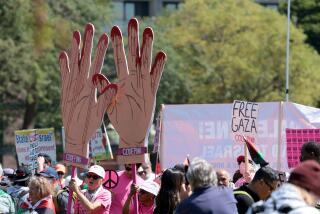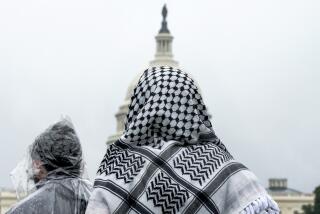Washington marchers follow in Martin Luther King’s footsteps
WASHINGTON — Deborah Miles was just 16 when her father brought her to the Lincoln Memorial 50 years ago to see the Rev. Martin Luther King Jr. speak at the March on Washington for Jobs and Freedom.
“My father said it was like the arms of Lincoln’s statue were embracing” King, Miles said. “You knew this was history in the making.”
Half a century later, Miles was among tens of thousands of people who came to the National Mall once again to hear leaders and activists speak from the steps of the memorial.
Families set up picnic blankets and chairs under the trees to escape the beating sun. Groups with matching T-shirts and signs brought their demonstrations into the crowd. For many, it was an opportunity to focus anew on work they said must still be done on racial and economic equality.
Martin Luther King III, son of the slain civil rights leader, called on those gathered to carry his father’s vision into the future.
PHOTOS: Looking back at the March on Washington
“This is not the time for nostalgic commemoration. This is not the time for self-congratulatory celebration,” King said. “The fight must continue.”
Rep. John Lewis (D-Ga.), who was the youngest speaker at the 1963 march, and House Minority Leader Nancy Pelosi (D-San Francisco) urged new legislation to replace key parts of the Voting Rights Act that were struck down by the Supreme Court in June.
“You’ve got to push and pull and make America what it ought to be,” Lewis exhorted the crowd. “Stand up, speak up, speak out and get in the way.”
Others found resonance in subjects that were not on the agenda in 1963, including immigration reform, gay rights, gender equality and gun control.
Carrying a sign through the crowd that said, “CEO: $7,000/hour. Teacher: $19.42/hour. Absurd,” Michael Gross was stopped repeatedly by people who took his picture or let out an “Amen!”
The university professor from North Carolina, whose parents were both teachers, was demonstrating against recent funding cuts to education in his state.
“This whole disparity is incredibly dangerous to our democratic republic,” he said.
Many in attendance held signs with pictures of Trayvon Martin, whose death in February 2012 sparked a national debate over racial profiling and “stand your ground” laws. Martin’s mother, Sybrina Fulton, was cheered loudly during a brief, emotional appearance.
For some attendees, the concerns of the original march still resonated.
“This is pretty much a reflection of where we were 50 years ago,” said Linda Lydia, who had taken an overnight bus from Dallas with her local chapter of the National Assn. for the Advancement of Colored People. African Americans are “still faced with joblessness. We’re still confronted with employment issues of being the last hired and the first fired.
“We’re moving backward as we’re moving forward,” she said.
FULL COVERAGE: March on Washington anniversary
Despite the talk of unfinished work, the mood of the day was often celebratory.
“People don’t usually speak to you in D.C., and they’re speaking today,” said Kyiefa Jones, a resident.
Unable to hear the speeches, she had decided to help pass out free water bottles to other attendees. “There’s a camaraderie,” she said. “It’s beautiful.”
A common message emerged from the disparate voices Saturday: Unite to improve conditions for everyone.
“There’s been many attempts to tell us we can’t work together because we’re too different,” Donna Payne, of the lesbian, gay, bisexual and transgender rights group Human Rights Campaign, said in a speech. “Don’t believe the hype! ... It’s about all of our civil rights, for everyone.”
After a final prayer led by the Rev. Bernice King, the civil rights leader’s daughter, thousands marched from the Lincoln Memorial to the Washington Monument — reversing the path of the original march.
Soul music blared from the speakers and people danced to Aretha Franklin’s “Respect.”
Marchers followed the route past the Martin Luther King Jr. Memorial, carrying banners and flags that rippled in the breeze. Above the chatter came chants of “Jobs, not jail!” and “No justice, no peace!” Groups broke out in renditions of “We Shall Overcome” and “This Little Light of Mine.”
Many stopped to get a picture with Miles, who had brought with her from Pennsylvania a pendant and button from the 1963 march.
Follow L.A. Times National on Twitter
More to Read
Sign up for Essential California
The most important California stories and recommendations in your inbox every morning.
You may occasionally receive promotional content from the Los Angeles Times.










